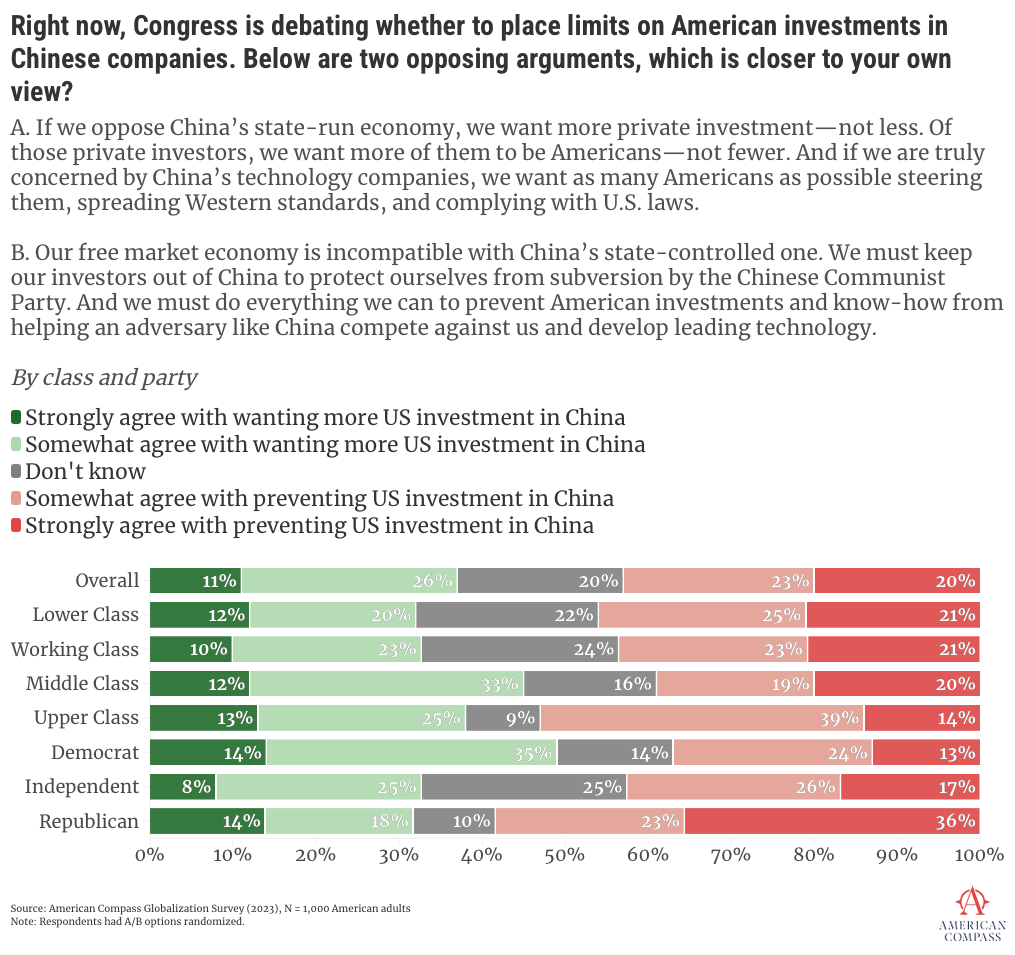

Executive Summary
The rejection of globalization has been among the most significant shifts in American politics in the past decade. While many economists continue to insist that globalization—and trade with China especially—has benefited the United States, the American people do not agree.
Experts have condemned opposition to globalization as “grievance-onomics” or an ill-informed reaction to populist demagoguery. At the extreme, Adam Posen, president of the Peterson Institute for International Economics, has argued that “what’s really going on” with concern for American manufacturing is “the general fetish for keeping white males of low education outside the cities in the powerful positions they’re in.” Former Secretary of Commerce Wilbur Ross wrote recently of Japan’s Nippon Steel acquiring U.S. Steel, “there is no real cause for concern other than xenophobia.” For all the cynical commentary, few efforts have been made to explore what Americans actually believe and why.
In November 2023, American Compass partnered with YouGov to survey 1,000 Americans about their views on globalization. We found:
- Americans have broadly negative views of globalization and trade with China, but not because they feel personally aggrieved. To the contrary:
- By a 41% to 28% margin, Americans said that they have personally benefited rather than suffered from America’s embrace of globalization and China.Yet at the same time, by a 47% to 33% margin, they said that the nation has suffered rather than benefited.
- While Americans across regions and classes are more likely to say they personally benefited rather than suffered, all except those in the upper class and living in coastal cities believe the nation has suffered.
- Americans are more skeptical of globalization broadly than of China in particular. The survey sample was split, with half of respondents asked about the effect of America’s embrace of “globalization” and half asked about the embrace of “China.”
- Asked about their personal situation, Americans across classes and regions were more likely to say they had suffered from the embrace of globalization than the embrace of China.
- Asked about the national situation, Americans had similar views regarding globalization or China—with the exception of those in the upper class and coastal cities, whose views were much more negative when asked specifically about China.
- The general view that globalization has harmed the nation is consistent with strong beliefs that both manufacturing and place matter—two judgments at odds with the pro-globalization consensus among economists.
- Asked whether policymakers should focus more on “helping struggling areas recover” from job loss or “helping people move to opportunity” where new jobs are created, Americans choose helping struggling areas by more than two-to-one.
- Similar results hold across region, class, gender, race, party, and generation.
- By even larger majorities, Americans agree that the nation needs a stronger manufacturing sector, somewhat for individual jobs and national security, but more so for economic growth and dynamism.
- Alongside 42% of Americans who say, “manufacturing is important to a healthy, growing, innovative economy,” 25% say, “manufacturing jobs are good jobs that support communities,” and 16% say, “manufacturing is important for our national security.”
- Only 3% say “the goal should be producing things where it can be done at the lowest cost,” 3% say “manufacturing is fine, but our policies aren’t going to bring it back,” and 2% say “manufacturing was the old economy, we need new-economy jobs.”
- Similar results hold across region, class, gender, race, party, and generation.
- Asked whether policymakers should focus more on “helping struggling areas recover” from job loss or “helping people move to opportunity” where new jobs are created, Americans choose helping struggling areas by more than two-to-one.
- Perhaps the best way to understand American attitudes toward globalization is by analogy to climate change, an issue on which many economists are eager to impose substantial costs for what they believe to be the greater social good. By nearly two-to-one, Americans say they would rather pay higher prices to strengthen American manufacturing than pay higher prices to combat climate change.
- 86% of Republicans and 66% of Independents prefer strengthening manufacturing, as do 65% of lower-class Democrats; other Democrats prefer combating climate change.
I. The Effects of Globalization
The survey began with a broad description of competing views about globalization’s effects:
In recent decades, America’s embrace of [globalization / China] has affected the economy in many ways. Some people believe that the effect has been mostly positive, emphasizing how trade and investment between the United States and [the world / China] have delivered new opportunities for businesses and workers and lower prices for consumers. Others believe that the effect has been mostly negative, emphasizing how multinational corporations have moved operations and jobs abroad and left many American behind.
Half of respondents saw the terms “globalization” and “the world” and half saw the term “China.”
Respondents were then asked, “Thinking about your own experience, how would you describe the overall effect on you, personally?” 41% of respondents reported that they had “benefited a lot” or “benefited some,” while 28% said that they had “suffered a lot” or “suffered some.” Respondents across classes were more likely to select “benefited” than to select “suffered,” however the margin rose from 1% among lower-class respondents to 29% for the upper class.
Likewise, using a regional breakdown, respondents living in coastal cities on the West Coast and in the Acela Corridor were far more likely to report benefiting personally.
In contrast, respondents had broadly negative views of how the embrace of China and globalization affected the nation as a whole. Overall, 47% of respondents said the nation had “suffered,” while 33% said it had “benefited.” Views varied by class, with everyone but upper-class respondents choosing “suffered” more often than “benefited”; working-class respondents had the most negative view. The regional view likewise diverged, with responses from coastal cities and everywhere else presenting mirror images.
In addition to questions about the effect on “you, personally” and “the nation as a whole,” respondents were asked about the effect of American’s embrace of globalization and China on “your family and friends” and “the community where you live.” Perceptions generally worsened as the frame of reference broadened.
To test the frequently advanced hypothesis that anti-globalization sentiment is driven by antipathy toward China or outright xenophobia, half of respondents were asked about the embrace of “globalization” and half about the embrace of “China” in the initial prompt. Comparing the “net benefit” share (the margin between respondents selecting “benefited a lot” or “benefited some” and those selecting “suffered a lot” or “suffered some”) among respondents prompted with China rather than globalization provides a measure of whether, all else equal, reference to China triggers a negative response.
No such anti-China bias appeared in the assessment of how the embrace of “China” or “globalization” had affected “you, personally.” To the contrary, respondents were more likely to report benefiting personally when asked about China and this difference was largest among lower- and working-class respondents.
When asked about the effect on “the nation as a whole,” a focus on the embrace of “China” versus “globalization” made no significant difference overall and for many groups. The only groups for whom explicit reference to “China” reduced the perception of net benefit for the nation were the upper class and residents of coastal cities.
Regardless of whether respondents were prompted initially with “China” or “globalization,” they were then told, “China poses an especially interesting set of issues for the United States,” and asked, “How would you describe China?”
“Rival” and “enemy” were the most frequent responses, with little variation across classes. Significantly more variation emerges across generations, with older Americans far more likely to choose “enemy” while younger Americans leaned toward “rival” and then even “a potential ally.”
II. Manufacturing and Place
What could explain so much skepticism of globalization’s effect on the nation as a whole, especially among respondents relatively more inclined to say they have benefited personally? Responses to two subsequent questions highlight ways in which American priorities and values conflict with the assumptions underlying recent decades of economic policy.
Place Matters
One of these questions emphasized the importance of place. Economic models treat places as disposable and assume that people can and should simply move to wherever new opportunities might be created. Americans disagree. To bring the issue into focus, the survey began described a common political tradeoff:
With changes in the economy in recent decades, jobs in some places have disappeared, while new ones have been created elsewhere. Many people face a choice between remaining in a community where they have roots or else moving in pursuit of greater opportunity. Policymakers face a choice between trying to help struggling areas recover and trying to help people move to more prosperous areas.
Respondents were then asked, “What do you think should be the focus for policymakers?”
Overall, 70% of respondents preferred a focus on “helping struggling areas to recover” while only 30% chose “helping people move to opportunity.” Views were broadly similar across nearly all demographic breakdowns including class, region, gender, party, and generation. Upper-class respondents, residents of coastal cities, and Millennials leaned seven to eight points further toward “moving to opportunity” but still favored “helping struggling areas” by large margins.
Making Things Matter
The second question studying the conflict between economic models and American values and priorities focuses on the issue of manufacturing. The survey asked, “Thinking about the argument made by some that we need a stronger American manufacturing sector, which of these is closest to your view?” and then provided six options. Three highlighted common arguments made by proponents of domestic manufacturing and three highlighted common arguments made by economists minimizing its value.
Overall, Americans chose the view that “we need a stronger manufacturing sector” by 10 to 1, with 83% choosing one of the three reasons in favor and 8% choosing one of the three reasons opposed. While many respondents chose the rationales emphasized most often in political rhetoric—good jobs (25%) and national security (16%)—the most popular response overall and within every demographic group was that “manufacturing is important to a healthy, growing, innovative economy” (42%). Conversely, the standard economic answer that “the goal should be producing things where it can be done at the lowest cost” was chosen by only 3% of respondents.
Responses were remarkably consistent across demographic groups including political parties, both in the broad preference for domestic manufacturing and the ranking of rationales.
III. Policies
Would Americans be willing to pay more to advance these priorities? Should they? While asking abstractly “what would you pay” is notoriously difficult, a comparative question can help with understanding both political dynamics and policy options. A robust political movement backed by numerous economists has attempted to make the case that that Americans can and should accept substantial costs to combat climate change. As the survey described:
Policymakers often consider laws that would change how goods are produced, in ways that might have large benefits in the long run but would also lead to higher prices in the short run. Two topics that have received a lot of attention in recent years are the risks of climate change and the decline of American manufacturing.
Respondents were then asked, “If you had to support at least one policy that would raise prices for you, which would be a higher priority?”
By 62% to 38%, Americans would rather pay higher prices to strengthen American manufacturing than pay higher prices to combat climate change. Those in the lower and working classes prefer the manufacturing focus by 2 to 1, while the middle class breaks 58% to 42% and the upper class is evenly split. Republicans and Independents likewise choose manufacturing by large margins, while Democrats break narrowly for climate change.
Of course, strengthening manufacturing and combatting climate change are not only alternative uses of resources, but also in direct tension insofar as intensive industry tends to be associated with higher greenhouse-gas emissions. The survey explained:
In an ideal world, many people would want America to have both the strongest possible industrial base (natural resource development, energy production, manufacturing, and so on) and the cleanest possible environment (air and water quality, endangered species protection, climate change mitigation, and so on). But these two goals are often in tension and policymakers must choose how much to pursue one at the expense of the other.
Respondents were then asked, “Thinking about America’s challenges and opportunities today, how would you like to see policymakers balance these goals?”
Overall, Americans were close to evenly divided on their priorities, with 52% leaning toward industry and 47% leaning toward the environment. On both sides, making some progress on the chosen priority without adversely affecting the competing priority was significantly more popular than making rapid progress on one at the direct expense of the other. Preferences were similar across classes and for political Independents, while Republicans (72% for industry) and Democrats (59% for environment) diverged sharply.
Finally, the survey asked specific questions regarding policy toward China. The survey explained:
On one hand, China represents one of the world’s biggest markets and an important growth opportunity for American corporations. On the other hand, the Chinese Communist Party controls the market and exerts its influence over anyone doing business in China.
Respondents were then asked, “How would you feel about a politician who said the following:”
Doing business with China is corrupting America. Hollywood studios censor their own movies to get them shown there. Professional athletes avoid criticizing human rights abuses because they want to sell sneakers there. One CEO whose company relies on the Chinese market recently promised to uphold “core socialist values” there. There’s only one way to put a stop to this: we have to pull American businesses out of China. No more making profits there. You can make your profits here, serving Americans.
This message was broadly popular, producing a 24% net increase in likelihood of support overall, with large increases across classes and for both Independents and Republicans. Democrats diverged from the consensus, with 44% saying they would be “much more likely to support” or “somewhat more likely to support” the candidate but 41% saying they would be “much less likely to support” or somewhat less likely to support” the candidate, for a net increase of only 3%.
One active debate in Congress concerns whether to place limits on American investments in Chinese companies. The survey presented opposing arguments on the issue—with a statement supporting limits taken from American Compass’s own work on the issue and one opposing limits taken from comments by Congressman Patrick McHenry, chairman of the House Financial Services Committee—and asked respondents, “Which is closer to your own view?”
Overall, Americans leaned toward people leaned toward preventing U.S. investment in China by 43% to 37%, with a notably large segment unsure (20%). Uncommon for a financial regulation issue, the upper class and Republicans were most in favor of restriction while the middle class and Democrats were most opposed.

ABOUT THE DATA
The American Compass Globalization Survey was conducted by YouGov between November 21 and 28, 2023, with a representative sample of 1,000 Americans. YouGov interviewed 1,163 respondents. The sampling frame is a politically representative “modeled frame” of U.S. adults, based upon the American Community Survey (ACS) public use microdata file, public voter file records, the 2020 Current Population Survey (CPS) Voting and Registration supplements, the 2020 National Election Pool (NEP) exit poll, and the 2020 CES surveys, including demographics and 2020 presidential vote.
The matched cases were weighted to the sampling frame using propensity scores. The matched cases and the frame were combined, and a logistic regression was estimated for inclusion in the frame. The propensity score function included age, gender, race/ethnicity, years of education, 2020 presidential vote choice and region. The propensity scores were grouped into deciles of the estimated propensity score in the frame and post-stratified according to these deciles.
The weights were then post-stratified on 2020 presidential vote choice as well as a four-way stratification of gender, age (four categories), race (four categories), and education (four categories), to produce the final weight.
In analysis of the results, “Class” is defined by education and income:
- “Lower” (N= 236): less than a four-year degree and household income below $30K; or did not report household income and do not have a high school diploma.
- “Working” (N= 312): less than a four-year degree and household income $30K–$80K; or did not report household income and have either a high school diploma or some college but no degree.
- “Middle” (N= 335): four-year degree or more and household income $30K–$80K; or household income $80K-$150K; or did not report household income and have a two-year or four-year college degree.
- “Upper” (N= 96): household income above $150K; or did not report household income and have a post-graduate degree.
Respondents with a four-year college degree or more but household income below $30K are excluded from analyses using the “Class” variable (N= 21).
Respondents are classified as residing in a “Coastal City” if they describe their state of residence is in the “Acela Corridor” (Massachusetts, Connecticut, Rhode Island, New York, New Jersey, Delaware, Maryland, District of Columbia) or on the West Coast (Washington, Oregon, California) and the type of area they live in is a “city.” Coastal City N = 133.
Generations are defined by the following years of birth:
- “Silent” (N= 39): 1928–1945
- “Baby Boomer” (N= 285): 1946–1964
- “Gen X” (N= 259): 1965–1980
- “Millennial” (N= 270): 1981–1996
- “Gen Z” (N= 147): 1997–2012
Recommended Reading
New Survey Shows American Rejection of Globalization
Economists and policymakers out of touch with what people value and why
Talkin’ (Policy) Shop: Globalization
On this episode of Talkin’ (Policy) Shop, Oren and Chris discuss globalization—how we got here, the problems it has created, and what policymakers should do now.
Globalization and NASCAR Changes: Two Errors Wrought by Misguided Elites
American Compass’s Wells King joins Robin Johnson on the Heartland Politics show to discuss globalization and NASCAR.










